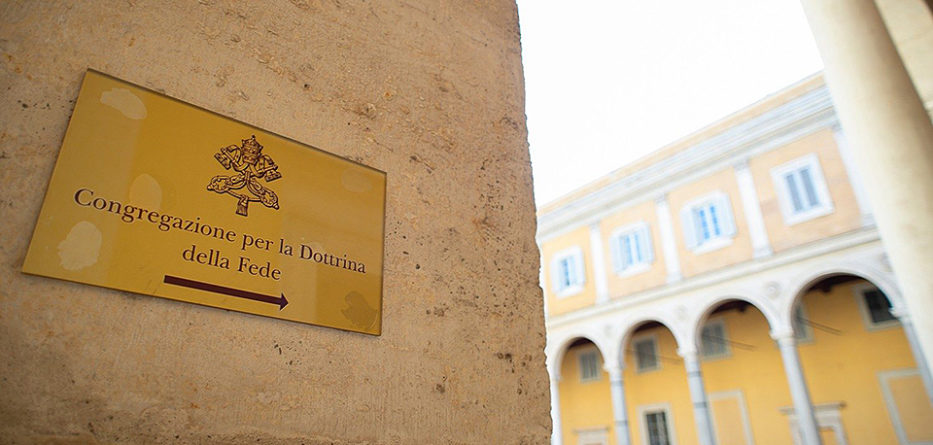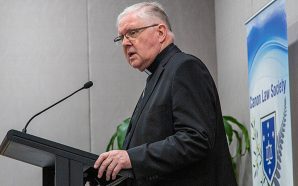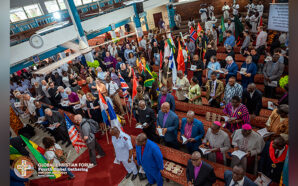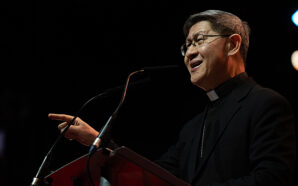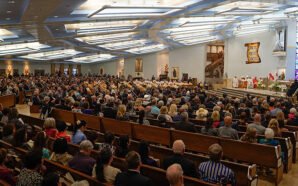Homily for the Fifth Sunday of Lent
Readings: Jeremiah 31:31-34; Psalm 50 (51):3-4, 12-15; Hebrews 5:7-9; John 12:20-30
21 March 2021
This week, the Church’s Congregation for the Doctrine of the Faith (CDF) in Rome published a response to a query whether the Church had “the power to give the blessing to unions of persons of the same sex”. It’s one word response was ‘Negative’. A simple ‘No’. Unlike many other Christian denominations, we Catholics have a theology and practice of seven sacraments, one of which, marriage, is administered by the couple, and not by the priest. The sacrament of marriage is not available to all couples. There are many people in the world living in blessed unions who have not availed themselves of the sacrament of marriage, most of them not fulfilling the criteria set down in the Church’s canon law. Many of them ask God’s blessing on their relationship every day and every night before they go to bed. Unlike many other Christian denominations, we Catholics bless all manner of things with liturgical actions. Those things include homes and pets. We Catholics have formal liturgical actions for blessing where others simply pray in the quietness of their hearts.
LISTEN: https://soundcloud.com/frank-brennan-6/homily-21321
The CDF has answered one question couched in terms of Church ‘power’, the giving of a blessing, and the bestowal of a blessing on a union of two persons. But there is another question: May a priest or any other member of the faithful fervently ask God’s blessing on any couple who are committed to loving each other for life, professing fidelity and mutual support for each other? In particular, may a priest or any other member of the faithful fervently ask God’s blessing on such a couple who are precluded from the sacrament of marriage, and may a priest or member of the faithful pray for such a couple that they will be happy and fulfilled in their lives together, avoiding injury to others? I answer unreservedly, ‘Yes’. This question is not couched in terms of ‘power’ and the bestowal of a blessing on a union but in terms of asking God to bless two people who are seeking to live a life faithful to each other in love.
In August 2017, I gave a lecture in which I stated: “Though I am a committed Catholic, I could vote ‘yes’ in a survey on same-sex marriage while hoping and demanding that the parliament do the hard work on religious freedoms when considering amendments to the Marriage Act. I am one of those Australians who will be pleased when same-sex marriages are recognised by Australian Law but with adequate protection for religious freedoms.”
Someone reported me to the CDF, as is their right in the Roman Church. The CDF requested that I publicly retract the two sentences I had publicly uttered. The CDF reminded me of its 2003 publication which stated that “where homosexual unions have been legally recognised or have been given the legal status and rights belonging to marriage, clear and emphatic opposition is a duty. One must refrain from any kind of formal co-operation in the enactment or application of such gravely unjust laws.”
I respectfully declined to retract my remarks. Unlike the CDF, I do not believe such laws are ‘gravely unjust’. I respect the various officers of the CDF. The prefect of the Congregation after all is a Jesuit cardinal. His jurisprudence about what constitutes a gravely unjust law is very different from mine, and I suspect, so too is some of his theology. But that’s OK. Pope Francis reminds us in latest encyclical Fratelli Tutti: “differences are creative; they create tension and in the resolution of tension lies humanity’s progress.”[1]
Happily, three years on, the CDF has left me alone, and as far as possible, I try to draw fruit from the observations of the CDF and to develop my own thinking on issues, particularly when I find myself at variance from the stands taken by the CDF. I feel sympathy for the CDF as they try to hold together many contradictory norms culminating in their explanation that their denial of Church power to give a blessing to a gay couple “does not preclude the blessings given to individual persons with homosexual inclinations.”
Like 61% of the Australian population who voted in the same-sex marriage plebiscite, I voted in favour. Incidentally, Catholics voted in favour in at least the same proportion as the general population. I then accepted appointment to the government’s committee set up to study the adequacy of religious freedom laws in Australia. In this electorate of Melbourne where we gather for Eucharist, 84% of those who voted were in favour of same-sex marriage laws.
In Germany, where same-sex marriage became legal just two months before it became legal in Australia, the Catholic bishops have been quite exercised and public in their deliberations about whether to institute or permit church ceremonies including the blessing of same-sex couples. Understandably there has been a strong difference of opinion within the German hierarchy. Here in Australia, our bishops don’t tend to engage in such public deliberations as they generally find themselves in happy agreement maintaining the liturgical status quo stipulated by the CDF. None of our Australian bishops has said publicly that he would be prepared to offer a blessing to a couple in a same-sex relationship no matter how faithful, committed and permanent such a relationship be. There are many priests and members of the faithful who would welcome a blessing being given reverentially and prayerfully in an appropriate setting and for an appropriate couple.
The German bishops’ conference president, Bishop Georg Bätzing, has said that he is “not happy” that the Vatican decided to participate so determinedly in the debate on blessings for homosexual couples: “It suggests that one wants to end the ongoing controversial theological discussions [on the subject] in various parts of the World Church, including in Germany, as soon as possible…That is, however, impossible, as the issue is being intensively discussed with good arguments, and theological inquiries concerning today’s pastoral practice cannot simply be got rid of by laying down the law.”
In today’s first reading, the prophet Jeremiah brings a message of hope to those whose world is falling apart. Jeremiah’s words are set against the backdrop of the Babylonian invasion which resulted in the destruction of Jerusalem and the Temple in 587BC. The scripture scholar Juliana Claasens tells us, “Throughout this book that is pulsating with raw emotion, one sees evidence of the community’s often convoluted struggle to understand and deal with the existential and theological crisis that impacted the very core of what the community believed about God, about the world, and about their place in it.”[2] The people are to be offered a new covenant, not like the old covenant with rules and regulations set down and imposed from above: “No, this is the covenant I will make with the House of Israel when those days arrive – it is the Lord who speaks. Deep within them I will plant my Law, writing it on their hearts. Then I will be their God and they shall be my people. There will be no further need for neighbour to try to teach neighbour, or brother to say to brother, ‘Learn to know the Lord!’ No, they will all know me, the least no less than the greatest – it is the Lord who speaks – since I will forgive their iniquity and never call their sin to mind.” Under this new covenant, with the Law written in our hearts, I daresay that the CDF would have a very different function than that of lawmaker demanding public retractions in relation to legitimately disputed questions like what constitutes a gravely unjust law.
In his encyclical Fratelli Tutti, Pope Francis writes: “Human beings are so made that they cannot live, develop and find fulfilment except ‘in the sincere gift of self to others’. Nor can they fully know themselves apart from an encounter with other persons: ‘I communicate effectively with myself only insofar as I communicate with others’. No one can experience the true beauty of life without relating to others, without having real faces to love.” Let’s try to understand what those words mean to a gay or lesbian person. I daresay they mean much the same as they mean to the rest of us, or they should. Francis goes on to say: “In the depths of every heart, love creates bonds and expands existence, for it draws people out of themselves and towards others. Since we were made for love, in each one of us ‘a law of ekstasis’ seems to operate: ‘the lover “goes outside” the self to find a fuller existence in another’.”[3]
I imagine there are many same-sex couples who would happily embrace these words of the Holy Father. If such a couple, precluded from the sacrament of marriage, were to present, asking God’s blessing, having committed themselves to loving each other for life, professing fidelity and mutual support, I would happily pray with them and join with them in asking God’s blessing upon them. I would seek advice about an appropriate liturgical formula and celebration. I would not rule out all prospect of a blessing. But being a Catholic priest, I will continue to reserve my witnessing of the sacrament of marriage to those who are eligible for marriage in our Church’s canon law.
I will continue to respect the CDF in its difficult role trying to articulate a consistent jurisprudence of all manner of things including gravely unjust laws, sacraments and blessings. The officers of the CDF, like each of us facing new pastoral realities in a complex world, need to come back to the starkly simple and beautiful insight offered by Pope Francis in Fratelli Tutti:
“The spiritual stature of a person’s life is measured by love, which in the end remains ‘the criterion for the definitive decision about a human life’s worth or lack thereof’. Yet some believers think that it consists in the imposition of their own ideologies upon everyone else, or in a violent defence of the truth, or in impressive demonstrations of strength. All of us, as believers, need to recognise that love takes first place: love must never be put at risk, and the greatest danger lies in failing to love (cf. 1 Cor 13:1-13).”[4]
It would be a mistake for any of us to think that the CDF has brought to an end all discussion and discernment in the Church about the blessing of same-sex couples. It’s ultimately not a question of the Church’s power to give a blessing but of the couple’s openness to receiving God’s grace. The CDF’s ruling on the limits of Church power does not restrict the ambit of God’s grace blessing human love. The unresolved issue is if, how and when the couple’s family, friends and local worshipping community can celebrate such blessing. German bishops are right to insist that the conversation continue. Let’s pray for the German bishops, the CDF personnel, the pope, and most especially those who were so hurt by the CDF’s declaration this week, including those Catholics who crave God’s blessing on their own loving, faithful, and committed relationships or on those of their loved ones.
Fr Frank Brennan SJ is the Rector of Newman College, Melbourne, the Distinguished Fellow of the P M Glynn Institute, Australian Catholic University, and the former CEO of Catholic Social Services Australia (CSSA).
[1] Pope Francis, Fratelli Tutti, #203
[2] L Juliana Classens, Jeremiah, in The Paulist Biblical Commentary, Paulist Press, New York, 2018, p.667
[3] Pope Francis, Fratelli Tutti, #88
[4] Pope Francis, Fratelli Tutti,#92




